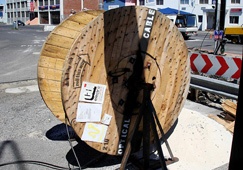New business development
SA broadband users jump 50%
'The connected life'
According to the study, many workers in South Africa today can perform their jobs in or out of the office - "the connected life" – which allows workers to be productive, responsive and creative in or out of their traditional office spaces. Remote or mobile workers can instantly access business-essential applications, colleagues, and partners worldwide regardless of their location, the study says, adding that this ability to collaborate and share information in real-time will undoubtedly help to increase business productivity and profitability across the region. "A mobile broadband connection is a key enabler of the 'connected life'," said Cisco South Africa senior manager Reshaad Sha. "Cisco Internet Business Solutions group defines 'connected life' services as those services that can be consumed anytime, anywhere, on any device and by anyone."Terrestrial fibre-optic networks
While the study also reports on the current and expected impact of the new undersea cables, which have been making most of the headlines in Internet news recently, it also explores, for the first time, the impact of the roll-out of terrestrial fibre-optic networks across South Africa. Whereas undersea cables connect the country to the world, terrestrial fibre extends that connectivity into the major cities and towns, where businesses and consumers are connected in turn. "The combination of new undersea cables and terrestrial fibre-optic networks means we are seeing the emergence of the next generation of connectivity technology, both in fixed line and wireless services," said Goldstuck. "The missing ingredients now are the next generation of customer access equipment for those who are connected, and affordable availability of access for those who are not." If all current cable projects come to fruition by 2011, the total capacity of undersea cables connecting Africa to the rest of the world will have increase 150-fold over 2008. At the end of 2009, the capacity was 1 690 Gigabits-per-second (Gbps). At the end of 2010 it will be 5 410 Gbps, and a year later 14 770 Gbps.Convergence of services
The study also delves into the impact internet access in having on South Africa, from increased access to government information services to new trends in entertainment and education. From a data perspective, consumers are using the internet to create blogs and personal websites with text, pictures and video, while the convergence of formally disparate services - voice, video and data - has provided a variety of new experiences, such as the integration of broadcast TV, video on demand (VoD) and telephony services. "The varied range of services and the demand consumers have started placing on Internet based application services has fuelled the uptake that we see today. Internet access speeds do need to scale in order to meet the demands of applications and services, specifically those that are video enabled," said Sha. "The network build outs that we are seeing in South Africa are positive steps towards the delivery of feature rich Internet services that most developed countries are already enjoying." SAinfo reporter
Would you like to use this article in your publication or on your website? See: Using SAinfo material

A spool of fibre-optic cable awaits deployment in Cape Town. Telecoms firms have been laying down more cable in the major centres across South Africa (Photo: Warrenski's Flickr photostream)
Related links
Related articles
- Smartphone 'revolution' at SA firms
- East African data cable lands in KZN
- SA internet users pass five million
- TelePresence: meetings without travel
- Seacom cable system goes live
- West Africa cable 'online by 2011'
- Internet access to double by 2014
- MTN, Neotel to build national network
- SA internet 'turnaround has begun'
- Telkom rolls out its own 3G network
- 3G cards gaining on WiFi spots




